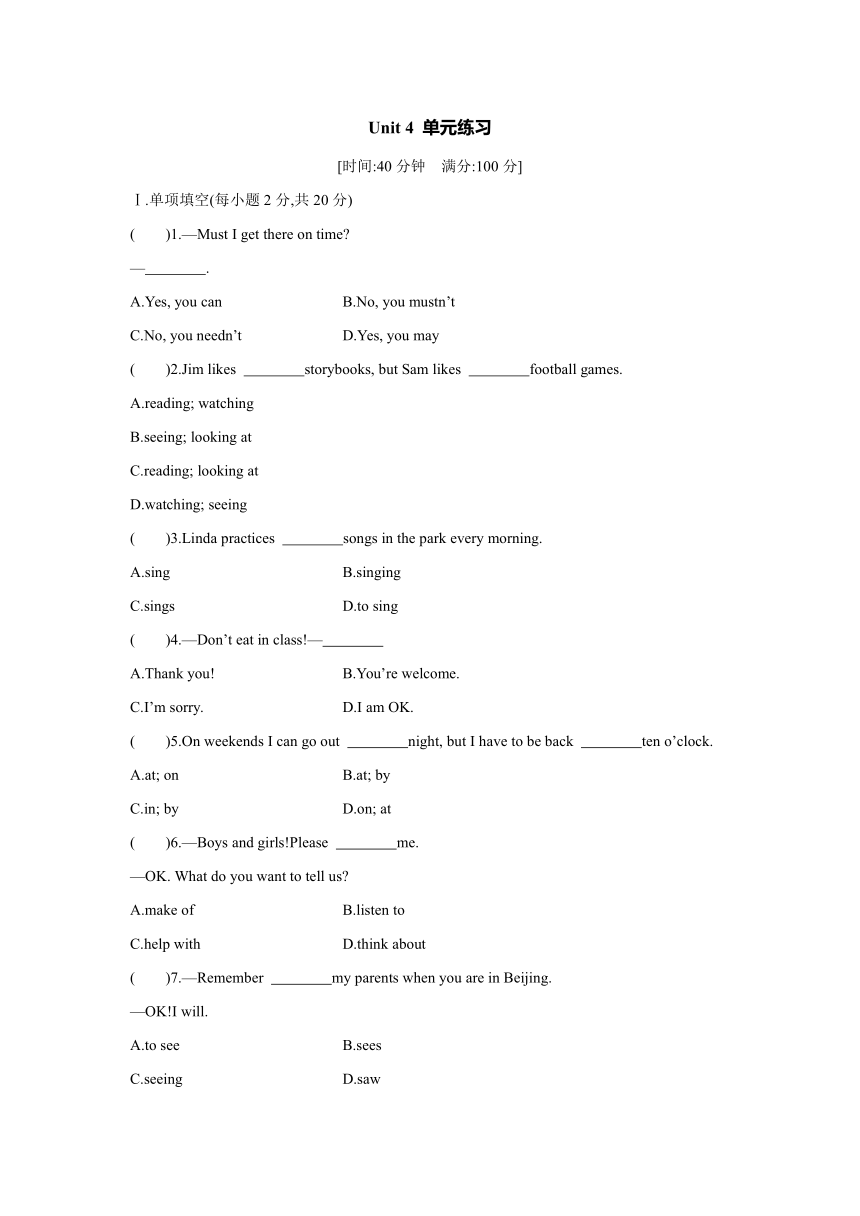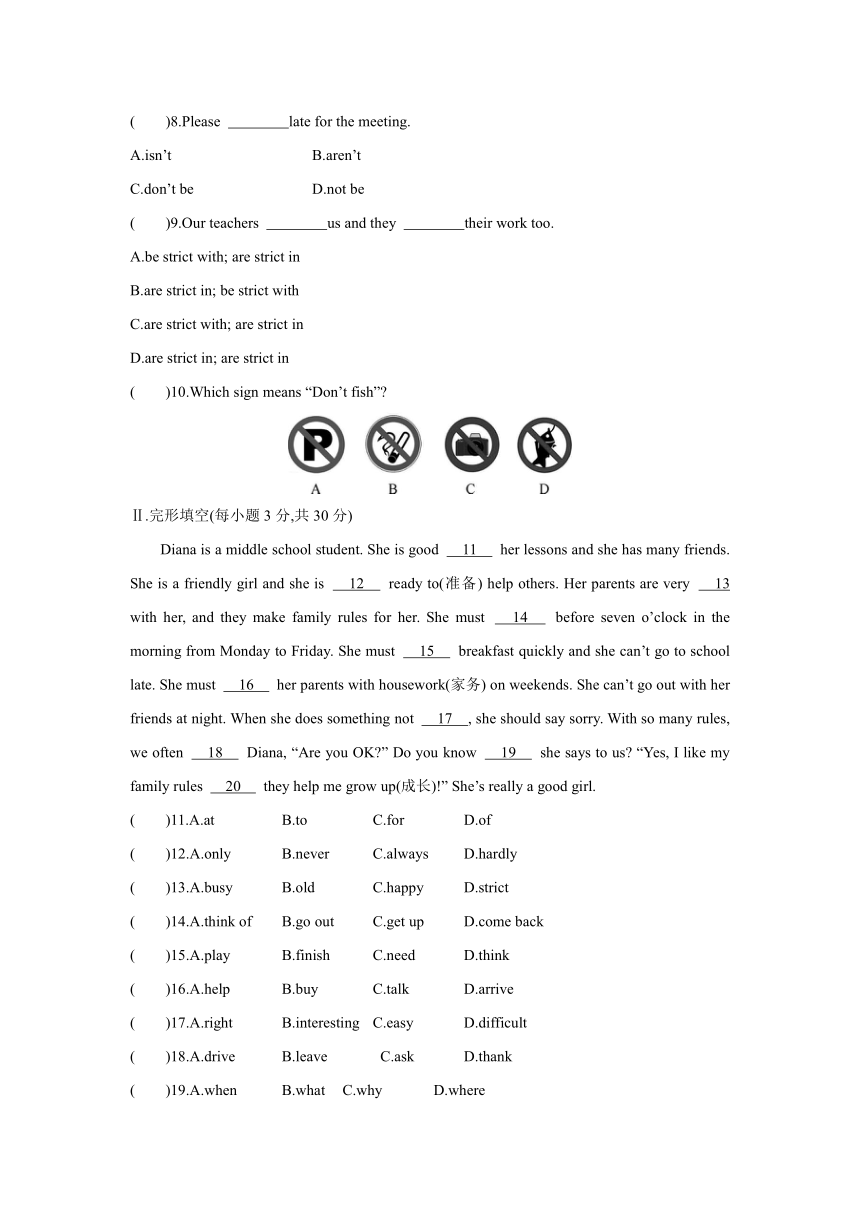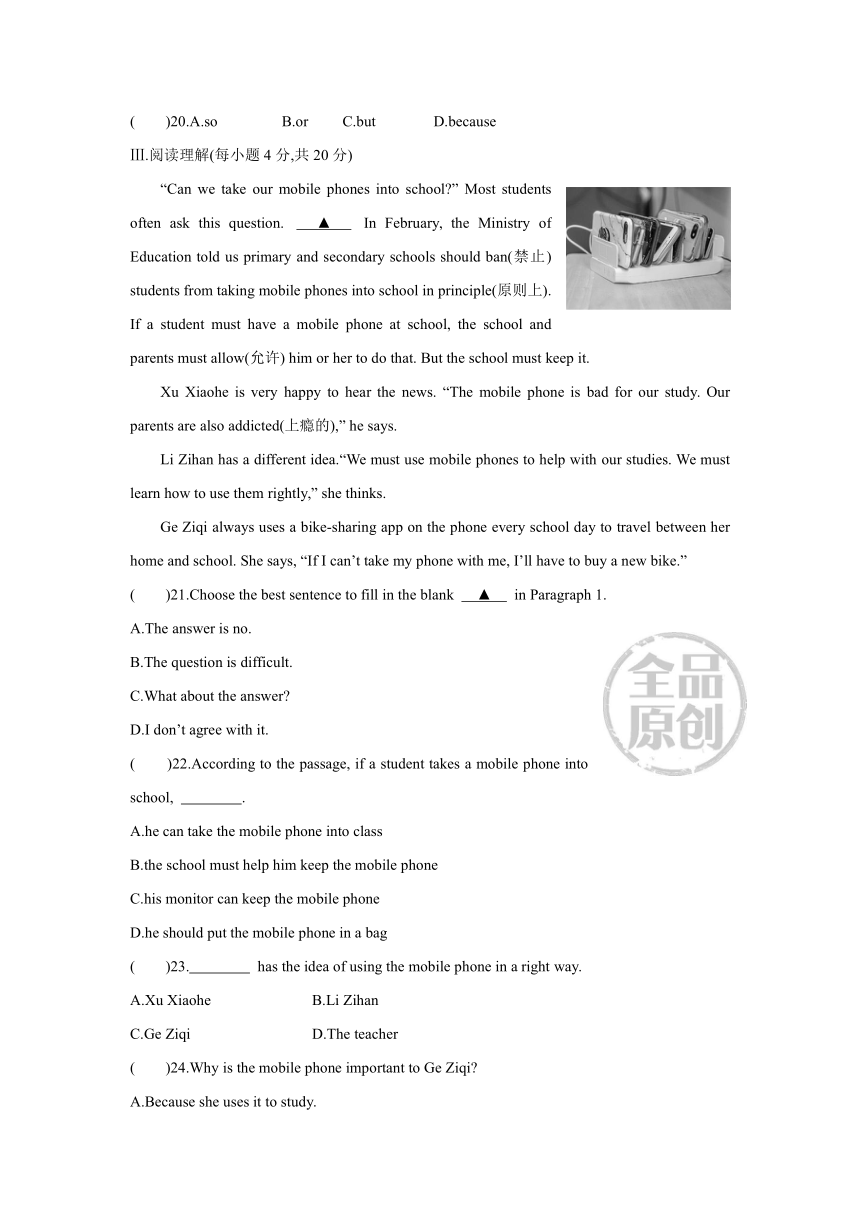人教版英语七年级下册Unit 4 Don't eat in class. 单元练习(含答案)
文档属性
| 名称 | 人教版英语七年级下册Unit 4 Don't eat in class. 单元练习(含答案) |  | |
| 格式 | docx | ||
| 文件大小 | 86.6KB | ||
| 资源类型 | 教案 | ||
| 版本资源 | 人教新目标(Go for it)版 | ||
| 科目 | 英语 | ||
| 更新时间 | 2022-04-08 20:59:26 | ||
图片预览



文档简介
Unit 4 单元练习
[时间:40分钟 满分:100分]
Ⅰ.单项填空(每小题2分,共20分)
( )1.—Must I get there on time
— .
A.Yes, you can B.No, you mustn’t
C.No, you needn’t D.Yes, you may
( )2.Jim likes storybooks, but Sam likes football games.
A.reading; watching
B.seeing; looking at
C.reading; looking at
D.watching; seeing
( )3.Linda practices songs in the park every morning.
A.sing B.singing
C.sings D.to sing
( )4.—Don’t eat in class!—
A.Thank you! B.You’re welcome.
C.I’m sorry. D.I am OK.
( )5.On weekends I can go out night, but I have to be back ten o’clock.
A.at; on B.at; by
C.in; by D.on; at
( )6.—Boys and girls!Please me.
—OK. What do you want to tell us
A.make of B.listen to
C.help with D.think about
( )7.—Remember my parents when you are in Beijing.
—OK!I will.
A.to see B.sees
C.seeing D.saw
( )8.Please late for the meeting.
A.isn’t B.aren’t
C.don’t be D.not be
( )9.Our teachers us and they their work too.
A.be strict with; are strict in
B.are strict in; be strict with
C.are strict with; are strict in
D.are strict in; are strict in
( )10.Which sign means “Don’t fish”
Ⅱ.完形填空(每小题3分,共30分)
Diana is a middle school student. She is good 11 her lessons and she has many friends. She is a friendly girl and she is 12 ready to(准备) help others. Her parents are very 13 with her, and they make family rules for her. She must 14 before seven o’clock in the morning from Monday to Friday. She must 15 breakfast quickly and she can’t go to school late. She must 16 her parents with housework(家务) on weekends. She can’t go out with her friends at night. When she does something not 17 , she should say sorry. With so many rules, we often 18 Diana, “Are you OK ” Do you know 19 she says to us “Yes, I like my family rules 20 they help me grow up(成长)!” She’s really a good girl.
( )11.A.at B.to C.for D.of
( )12.A.only B.never C.always D.hardly
( )13.A.busy B.old C.happy D.strict
( )14.A.think of B.go out C.get up D.come back
( )15.A.play B.finish C.need D.think
( )16.A.help B.buy C.talk D.arrive
( )17.A.right B.interesting C.easy D.difficult
( )18.A.drive B.leave C.ask D.thank
( )19.A.when B.what C.why D.where
( )20.A.so B.or C.but D.because
Ⅲ.阅读理解(每小题4分,共20分)
“Can we take our mobile phones into school ” Most students often ask this question. ▲ In February, the Ministry of Education told us primary and secondary schools should ban(禁止) students from taking mobile phones into school in principle(原则上). If a student must have a mobile phone at school, the school and parents must allow(允许) him or her to do that. But the school must keep it.
Xu Xiaohe is very happy to hear the news. “The mobile phone is bad for our study. Our parents are also addicted(上瘾的),” he says.
Li Zihan has a different idea.“We must use mobile phones to help with our studies. We must learn how to use them rightly,” she thinks.
Ge Ziqi always uses a bike-sharing app on the phone every school day to travel between her home and school. She says, “If I can’t take my phone with me, I’ll have to buy a new bike.”
( )21.Choose the best sentence to fill in the blank ▲ in Paragraph 1.
A.The answer is no.
B.The question is difficult.
C.What about the answer
D.I don’t agree with it.
( )22.According to the passage, if a student takes a mobile phone into school, .
A.he can take the mobile phone into class
B.the school must help him keep the mobile phone
C.his monitor can keep the mobile phone
D.he should put the mobile phone in a bag
( )23. has the idea of using the mobile phone in a right way.
A.Xu Xiaohe B.Li Zihan
C.Ge Ziqi D.The teacher
( )24.Why is the mobile phone important to Ge Ziqi
A.Because she uses it to study.
B.Because she uses it to call her parents.
C.Because she uses it to listen to music.
D.Because she uses a bike-sharing app on the phone every school day.
( )25.What does the passage mainly tell us
A.There are three students using mobile phones at school.
B.We should use mobile phones rightly.
C.Mobile phones are bad for our studies.
D.Primary and secondary schools ban mobile phones and three different opinions.
Ⅳ.任务型阅读(每小题2分,共10分)
Dear Dave,
There are many rules in my family. At 6:30 in the morning, I must get up. On school days, I must have breakfast at 6:50. Then I have to do the dishes. I must go back home before 6:00 in the afternoon. And I can’t watch TV on school nights, but I really want to relax. I must do a lot of reading and sports on weekends. I must clean my room and wash my clothes. I think the rules are strict. It’s terrible!Are there many rules in your family
Yours,
Laura
Dear Laura,
There are many rules in my family, too. For example(比如), I can’t watch TV or play computer games on school nights. Many other rules are strict. I can’t do many things. But I always think about the things I can do. That makes me happy. I know you like playing basketball, so you can play it on weekends. Some rules are strict, but they can help us.
Good luck, my dear cousin.
Yours,
Dave
根据短文内容,回答下列问题。
26.What time must Laura have breakfast on school days
______________________________________________________________________________
27.Who can’t watch TV on school nights
______________________________________________________________________________
28.What do Laura and Dave both(都) think of the rules in their family
______________________________________________________________________________
29.Who likes playing basketball
______________________________________________________________________________
30.What is the relationship(关系) between Laura and Dave
______________________________________________________________________________
Ⅴ.根据短文内容及首字母提示完成短文(每小题2分,共20分)
Mrs. Green is my neighbor. She 31.w in a big company(公司). There are lots of 32.r in her company. First, anybody can’t 33.a late for work. Second, they can’t 34.t their breakfast to the office. Third, they have to 35.w uniforms in the company. 36.F , during the working time, they can’t watch movies, chat(聊天) on QQ or 37.l to music. 38.B they can discuss(讨论) something through MSN. Last,they have to be 39.q in the office. Everyone must 40.f the rules.
答案
Unit 4 单元练习
Ⅰ.1.C
2.A watch尤指看电视、看球赛等;see 强调看的结果,意为“看到,看见”;look强调看的动作,与at连用后加看的对象;read 后接纸张类阅读物,如书、报纸、杂志、小说、地图等。故选A。
3.B 4.C 5.B
6.B 考查动词短语辨析。句意:“孩子们!请听我说。”“好的。你想告诉我们什么 ”listen to意为“听”。故选B。
7.A 8.C 9.C 10.D
Ⅱ.11.A be good at意为“擅长”,为固定搭配。
12.C 由文中“She is a friendly girl”可知,她对人友好,所以她总是准备帮助别人。故选C。
13.D 由文中“and they make family rules for her”及后面内容可知,父母对她要求非常严格。故选D。
14.C 由句中的“before seven o'clock in the morning”可知,这里指的是“起床”。故选C。
15.B 她必须很快地吃完早饭。finish breakfast意为“吃完早饭”。
16.A help sb. with sth.意为“帮助某人做某事”,为固定词组。
17.A 由句子“she should say sorry”可知,这里指的是“做错事”。not right意为“不对的;错的”。
18.C 由下文的“Are you OK ”可知,这里问的是问题。故选C。
19.B 所填词作says的宾语,故用疑问代词what。
20.D 所填词引导的句子表原因,应用because。
Ⅲ. 本文主要介绍了在二月份教育部原则上禁止中小学生把手机带进校园以及三名学生对此的观点。
21.A 推理判断题。上句提到了大部分学生经常问这个问题,下一句又提到在二月份教育部通知原则上中小学应该禁止学生将手机带入校园。所以此处应是“答案是不能带手机入校”。故选A。
22.B 细节理解题。由第一段最后两句可知,如果经过学校和家长允许,学生带手机入校,学校必须保管它。故选B。
23.B 细节理解题。由李子涵的观点可知,她建议我们合理使用手机。
24.D 细节理解题。由第四段第一句话可知,葛子琪每天骑共享单车上下学,因此手机对她很重要。故选D。
25.D 主旨大意题。本文主要介绍了教育部原则上禁止中小学生携带手机进入校园以及三名学生对此的观点。故选D。
Ⅳ.26.At 6:50 a.m. 27.Laura and Dave. 28.They both think they are strict.
29.Laura. 30.They are cousins.
Ⅴ.31.works 32.rules 33.arrive 34.take 35.wear 36.Fourth
37.listen 38.But 39.quiet 40.follow
[时间:40分钟 满分:100分]
Ⅰ.单项填空(每小题2分,共20分)
( )1.—Must I get there on time
— .
A.Yes, you can B.No, you mustn’t
C.No, you needn’t D.Yes, you may
( )2.Jim likes storybooks, but Sam likes football games.
A.reading; watching
B.seeing; looking at
C.reading; looking at
D.watching; seeing
( )3.Linda practices songs in the park every morning.
A.sing B.singing
C.sings D.to sing
( )4.—Don’t eat in class!—
A.Thank you! B.You’re welcome.
C.I’m sorry. D.I am OK.
( )5.On weekends I can go out night, but I have to be back ten o’clock.
A.at; on B.at; by
C.in; by D.on; at
( )6.—Boys and girls!Please me.
—OK. What do you want to tell us
A.make of B.listen to
C.help with D.think about
( )7.—Remember my parents when you are in Beijing.
—OK!I will.
A.to see B.sees
C.seeing D.saw
( )8.Please late for the meeting.
A.isn’t B.aren’t
C.don’t be D.not be
( )9.Our teachers us and they their work too.
A.be strict with; are strict in
B.are strict in; be strict with
C.are strict with; are strict in
D.are strict in; are strict in
( )10.Which sign means “Don’t fish”
Ⅱ.完形填空(每小题3分,共30分)
Diana is a middle school student. She is good 11 her lessons and she has many friends. She is a friendly girl and she is 12 ready to(准备) help others. Her parents are very 13 with her, and they make family rules for her. She must 14 before seven o’clock in the morning from Monday to Friday. She must 15 breakfast quickly and she can’t go to school late. She must 16 her parents with housework(家务) on weekends. She can’t go out with her friends at night. When she does something not 17 , she should say sorry. With so many rules, we often 18 Diana, “Are you OK ” Do you know 19 she says to us “Yes, I like my family rules 20 they help me grow up(成长)!” She’s really a good girl.
( )11.A.at B.to C.for D.of
( )12.A.only B.never C.always D.hardly
( )13.A.busy B.old C.happy D.strict
( )14.A.think of B.go out C.get up D.come back
( )15.A.play B.finish C.need D.think
( )16.A.help B.buy C.talk D.arrive
( )17.A.right B.interesting C.easy D.difficult
( )18.A.drive B.leave C.ask D.thank
( )19.A.when B.what C.why D.where
( )20.A.so B.or C.but D.because
Ⅲ.阅读理解(每小题4分,共20分)
“Can we take our mobile phones into school ” Most students often ask this question. ▲ In February, the Ministry of Education told us primary and secondary schools should ban(禁止) students from taking mobile phones into school in principle(原则上). If a student must have a mobile phone at school, the school and parents must allow(允许) him or her to do that. But the school must keep it.
Xu Xiaohe is very happy to hear the news. “The mobile phone is bad for our study. Our parents are also addicted(上瘾的),” he says.
Li Zihan has a different idea.“We must use mobile phones to help with our studies. We must learn how to use them rightly,” she thinks.
Ge Ziqi always uses a bike-sharing app on the phone every school day to travel between her home and school. She says, “If I can’t take my phone with me, I’ll have to buy a new bike.”
( )21.Choose the best sentence to fill in the blank ▲ in Paragraph 1.
A.The answer is no.
B.The question is difficult.
C.What about the answer
D.I don’t agree with it.
( )22.According to the passage, if a student takes a mobile phone into school, .
A.he can take the mobile phone into class
B.the school must help him keep the mobile phone
C.his monitor can keep the mobile phone
D.he should put the mobile phone in a bag
( )23. has the idea of using the mobile phone in a right way.
A.Xu Xiaohe B.Li Zihan
C.Ge Ziqi D.The teacher
( )24.Why is the mobile phone important to Ge Ziqi
A.Because she uses it to study.
B.Because she uses it to call her parents.
C.Because she uses it to listen to music.
D.Because she uses a bike-sharing app on the phone every school day.
( )25.What does the passage mainly tell us
A.There are three students using mobile phones at school.
B.We should use mobile phones rightly.
C.Mobile phones are bad for our studies.
D.Primary and secondary schools ban mobile phones and three different opinions.
Ⅳ.任务型阅读(每小题2分,共10分)
Dear Dave,
There are many rules in my family. At 6:30 in the morning, I must get up. On school days, I must have breakfast at 6:50. Then I have to do the dishes. I must go back home before 6:00 in the afternoon. And I can’t watch TV on school nights, but I really want to relax. I must do a lot of reading and sports on weekends. I must clean my room and wash my clothes. I think the rules are strict. It’s terrible!Are there many rules in your family
Yours,
Laura
Dear Laura,
There are many rules in my family, too. For example(比如), I can’t watch TV or play computer games on school nights. Many other rules are strict. I can’t do many things. But I always think about the things I can do. That makes me happy. I know you like playing basketball, so you can play it on weekends. Some rules are strict, but they can help us.
Good luck, my dear cousin.
Yours,
Dave
根据短文内容,回答下列问题。
26.What time must Laura have breakfast on school days
______________________________________________________________________________
27.Who can’t watch TV on school nights
______________________________________________________________________________
28.What do Laura and Dave both(都) think of the rules in their family
______________________________________________________________________________
29.Who likes playing basketball
______________________________________________________________________________
30.What is the relationship(关系) between Laura and Dave
______________________________________________________________________________
Ⅴ.根据短文内容及首字母提示完成短文(每小题2分,共20分)
Mrs. Green is my neighbor. She 31.w in a big company(公司). There are lots of 32.r in her company. First, anybody can’t 33.a late for work. Second, they can’t 34.t their breakfast to the office. Third, they have to 35.w uniforms in the company. 36.F , during the working time, they can’t watch movies, chat(聊天) on QQ or 37.l to music. 38.B they can discuss(讨论) something through MSN. Last,they have to be 39.q in the office. Everyone must 40.f the rules.
答案
Unit 4 单元练习
Ⅰ.1.C
2.A watch尤指看电视、看球赛等;see 强调看的结果,意为“看到,看见”;look强调看的动作,与at连用后加看的对象;read 后接纸张类阅读物,如书、报纸、杂志、小说、地图等。故选A。
3.B 4.C 5.B
6.B 考查动词短语辨析。句意:“孩子们!请听我说。”“好的。你想告诉我们什么 ”listen to意为“听”。故选B。
7.A 8.C 9.C 10.D
Ⅱ.11.A be good at意为“擅长”,为固定搭配。
12.C 由文中“She is a friendly girl”可知,她对人友好,所以她总是准备帮助别人。故选C。
13.D 由文中“and they make family rules for her”及后面内容可知,父母对她要求非常严格。故选D。
14.C 由句中的“before seven o'clock in the morning”可知,这里指的是“起床”。故选C。
15.B 她必须很快地吃完早饭。finish breakfast意为“吃完早饭”。
16.A help sb. with sth.意为“帮助某人做某事”,为固定词组。
17.A 由句子“she should say sorry”可知,这里指的是“做错事”。not right意为“不对的;错的”。
18.C 由下文的“Are you OK ”可知,这里问的是问题。故选C。
19.B 所填词作says的宾语,故用疑问代词what。
20.D 所填词引导的句子表原因,应用because。
Ⅲ. 本文主要介绍了在二月份教育部原则上禁止中小学生把手机带进校园以及三名学生对此的观点。
21.A 推理判断题。上句提到了大部分学生经常问这个问题,下一句又提到在二月份教育部通知原则上中小学应该禁止学生将手机带入校园。所以此处应是“答案是不能带手机入校”。故选A。
22.B 细节理解题。由第一段最后两句可知,如果经过学校和家长允许,学生带手机入校,学校必须保管它。故选B。
23.B 细节理解题。由李子涵的观点可知,她建议我们合理使用手机。
24.D 细节理解题。由第四段第一句话可知,葛子琪每天骑共享单车上下学,因此手机对她很重要。故选D。
25.D 主旨大意题。本文主要介绍了教育部原则上禁止中小学生携带手机进入校园以及三名学生对此的观点。故选D。
Ⅳ.26.At 6:50 a.m. 27.Laura and Dave. 28.They both think they are strict.
29.Laura. 30.They are cousins.
Ⅴ.31.works 32.rules 33.arrive 34.take 35.wear 36.Fourth
37.listen 38.But 39.quiet 40.follow
同课章节目录
- Unit 1 Can you play the guitar?
- Section A
- Section B
- Unit 2 What time do you go to school?
- Section A
- Section B
- Unit 3 How do you get to school?
- Section A
- Section B
- Unit 4 Don't eat in class.
- Section A
- Section B
- Unit 5 Why do you like pandas?
- Section A
- Section B
- Unit 6 I'm watching TV.
- Section A
- Section B
- Review of Units 1-6
- Unit 7 It's raining!
- Section A
- Section B
- Unit 8 Is there a post office near here?
- Section A
- Section B
- Unit 9 What does he look like?
- Section A
- Section B
- Unit 10 I'd like some noodles.
- Section A
- Section B
- Unit 11 How was your school trip?
- Section A
- Section B
- Unit 12 What did you do last weekend?
- Section A
- Section B
